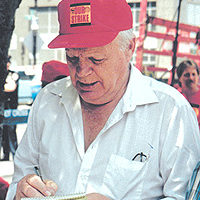A coup by high-ranking military officers and business leaders April 12 forcibly removed Venezuelan President Hugo Chavez from office and installed Pedro Carmona, head of the nation’s business association, as “president.”
Forty-eight hours later Chavez was back in residence at the presidential palace, put there by protests in the sprawling working-class neighborhoods of Caracas and a demonstration of 100,000 that surrounded the presidential palace and forced Carmona to resign.
The Communist Party of Venezuela blamed Caracas Mayor Alfredo Penata for shootings that left 11 dead during clashes between pro- and anti-Chavez demonstrators on April 11. The statement says nine of the 11 victims were known supporters of Chavez, as were four of the five who had been shot in the forehead – thus assassinated at close range.
The Party statement said the purpose of the coup was to hand over Venezuela’s oil and other natural resources to transnational corporations.
As one of his first acts, Carmona stopped shipments of oil to Cuba. He also threw out the Venezuelan Constitution by abolishing the National Assembly and Supreme Court.
The Bush administration faced sharp questions on their role in the coup and their failure to join the unanimous condemnation by Latin American countries at the forced removal of a democratically elected leader.
On April 16, the White House admitted that Otto Reich, assistant secretary for Western Hemisphere affairs, phoned Carmona on April 12. The disclosure raised questions about whether Reich was stage-managing the takeover by Carmona.
Reich has lots of experience undermining democracy in Latin America. From 1983 through 1986, Reich headed the State Department’s Office of Public Diplomacy in which he collaborated with Lt. Col. Oliver North in delivering arms secretly to the Contra mercenaries in Central America.
Under Reich, the U.S. State Department reportedly contracted with a dummy corporation, International Business Communications, which funneled arms to the Nicaraguan Contra rebels violating a Congressional ban.
Reich was a lobbyist for Lockheed Martin and is supported by the far-right anti-Cuba mafia.
Carmona, was but one of many Chavez opponents who had visited Washington for talks with White House, State Department and Pentagon officials in recent weeks, secretly scheming to oust Chavez from office.
Others – including Carlos Ortega, head of the million-member Venezuelan Confederation of Labor, and Gen. Lucas Romero Rincon, chief of the Venezuelan military high command – met with Rogelio Pardo-Maurer, a former Nicaraguan Contra, now the Pentagon’s official responsible for Latin America. Ortega was hosted at AFL-CIO headquarters in December.
Sen. Christopher Dodd (D-Conn.), chair of the Senate Sub-Committee on Western Hemisphere Affairs, said, “While all the details of the attempted coup in Venezuela are not yet known, what is clear is that the vast majority of governments in the hemisphere lived up to their responsibilities under the Inter-American Democratic Charter, and denounced the unconstitutional efforts to take power from a government which had been freely elected.”
The OAS met April 14 and adopted a resolution expressing concern at “the alteration of constitutional order in Venezuela.”
That same day National Security Advisor Condoleezza Rice arrogantly warned Chavez “to right his own ship,” which she said “has been moving in the wrong direction for quite a long time.” (Chavez won his six-year presidential term with 59 percent of the popular vote; Bush lost the popular vote in 2000 and was installed by the Supreme Court.)
Venezuela cast the only vote against the Free Trade Area of the Americas and has close relations with socialist Cuba, reflecting Chavez’ political independence. Venezuela’s state-owned oil company ships 1.6 million barrels of oil daily to the United States. Chavez has brought Venezuela into close harmony with OPEC in charging the U.S. a fair market price for oil, enraging the Bush administration.
The author can be reached at fgab708@aol.com.









Comments